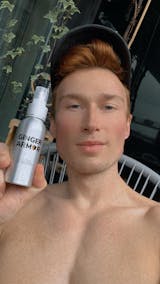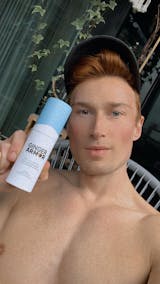Skyler Brady
5/27/23
I do my best to add citations and encourage everyone to as well, that way if we learn something new we can recalibrate our reactions based on updated facts. It’s important for you to come to your own conclusions, not to listen or trust anyone just because you want to believe or they are charismatic or seem to be an expert to you.
In this day and age I think we should cite everything BUT sometimes there aren’t studies or there are studies but interpretations vary, some say 1 thing is important and others say a different thing about the study is important.
For example:
Objective facts:
- Chemical sunscreens including (avobenzone, homosalate, octinoxate, octisalate, etc.) absorb into your bloodstream after 2 hours of applying
- Stays in bloodstream for up to 3 weeks after absorption.
- FDA removed them from it’s GRASE (Generally Recognized as Safe and Effective) list
- Hawaii and International bans on chemical sunscreen causing damaging to our coral reefs
Additional citations: https://www.cntraveler.com/story/these-destinations-are-banning-certain-sunscreens
Opinion 1:
- this is blown out of proportion, the amount going into your bloodstream is minute,
- Many things are in and stay in our bloodstream
- The FDA is being overly cautious about these sunscreen products
- These places are wrong that chemical sunscreen is the culprit
Opinion 2
- Any amount of sunscreen in by bloodstream is a red flag and concern
- Why does it take so long for the body to get rid of it? I don’t like that…
- The FDA changing its mind about safety of any ingredient is a big deal
- If Hawaii, Aruba and other Governments are banning ingredients we should too
My advice:
Remind yourself of the difference between an opinion and a fact.
Is it measurable and proven by studies?
If it’s an opinion, that doesn’t mean it’s not valid-but it is not a fact.
Ask yourself, why would someone want to tell me what they’re telling me?
What is their reasoning for doing so?
Is their reasoning for telling me to: help me, or to push an agenda, are they sponsored by a particular company or group?
What does their company or group represent by their actions?
What do they actually do.
How does one narrative over another benefit said company or group?
Full disclosure, I own and operate a small sunscreen company, because I am more aligned with Opinion 2 than opinion 1 about the scientific facts gathered and confirmed by the FDA.
So I put together a very intentional ingredient list, packaging, mission, and focus.
Of course I am going to tell you that mine is the best, right?
No! The best sunscreen is the 1 that you’ll actually wear. Even though I don’t like chemical sunscreen, cancer scares me more than using chemical sunscreen.
It is a scientific fact that
Skin cancer is the most common form of cancer in the United States and about 90% preventable!
So trust me when I say that even if you don’t love my sunscreen, I want you to wear something but of course I want you to try mine, because I believe that it’s one of the best options out there if you’re concerned about your health, it blending in, a fair price and being planet friendly.
But your skin is your skin and your values are your values, so try it out and if you love it use it, if you don’t, return it or give it away to a friend and find one that you do love!
Everyone’s skin is different-so there is no one size fits all, but just about everyone can benefit from wearing sunscreen at least occasionally-and most of us need to wear it at least 200 days of the year because we are exposed to UV index ratings of 3 or higher 200 days of the year, and this is the recommended UV index rating minimum that requires sunscreen.
Use your mind, follow your heart and listen to your gut when facts or opinions come your way, and always know the difference between fact and opinion.
Citations:
https://cen.acs.org/safety/consumer-safety/evidence-sunscreens-absorb-through-skin/98/i4
https://www.fda.gov/food/food-ingredients-packaging/generally-recognized-safe-gras
https://www.cntraveler.com/story/these-destinations-are-banning-certain-sunscreens





